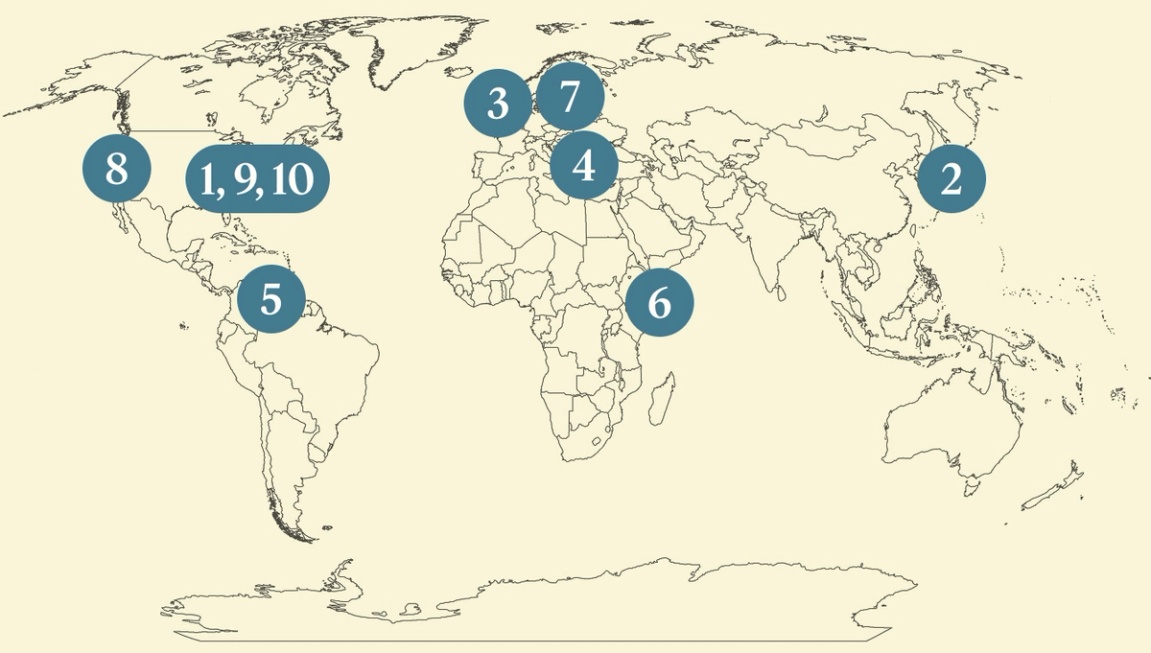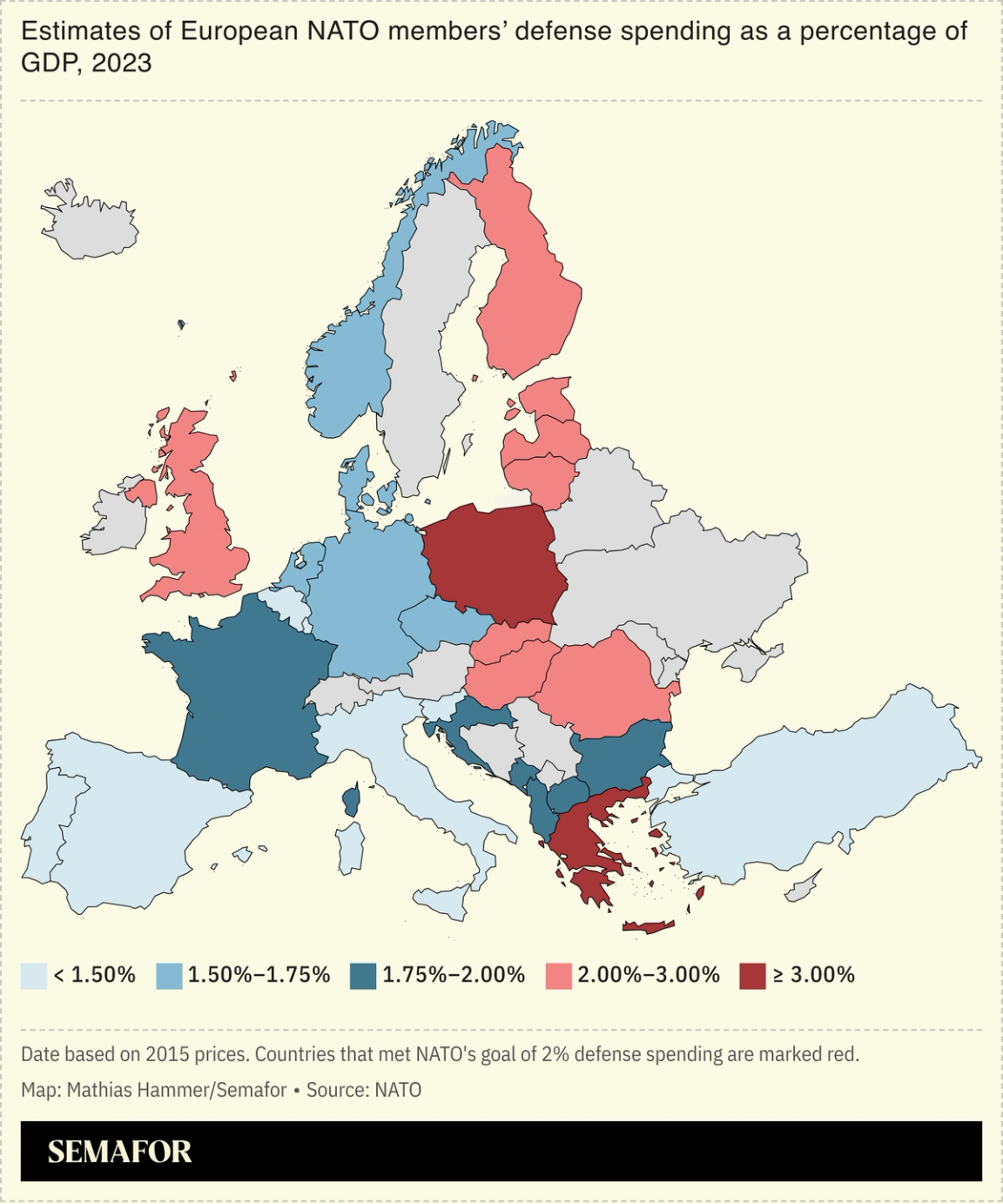| | Corporate giants warn that US tariffs are hurting their businesses, Europe reshapes its defense indu͏ ͏ ͏ ͏ ͏ ͏ |
| |   Hargeisa Hargeisa |   Bucharest Bucharest |   Runcorn Runcorn |
 | Flagship |  |
| |
|
The World Today |  - Firms warn of tariff pain
- Trade deal progress
- UK populists’ election win
- Romania in rare spotlight
- Legal setback for Trump
- Somalia blocks Taiwanese
- Europe’s defense reshape
- Waymos safer than humans
- NYC traffic toll working
- BMI: Still useful
 The curse of the world’s oldest person strikes again, and recommending a boozy, rowdy single by two young Norwegians. |
|
US corporate tariff warnings |
 Carlos Osorio/File Photo/Reuters Carlos Osorio/File Photo/ReutersAmerican corporate giants warned of major hits to their businesses from US President Donald Trump’s trade war. Apple and Amazon pointed to the risks of the wide-ranging tariffs — the iPhone maker said duties could add $900 million in costs in the second quarter alone — while General Motors slashed its profit outlook for the year and McDonald’s saw US sales drop the most since the COVID-19 pandemic. Trump’s “Liberation Day” tariffs are currently suspended but could be reinstated within months, and the resulting uncertainty surrounding US trade policy isn’t just hitting businesses: One expert warned it “is damaging for the entire financial system.” |
|
Progress in US trade talks |
 Japan and the EU lauded progress on trade talks with the US, but warned Washington of consequences if deals were not reached soon. Tokyo said negotiations over lowering tariffs could conclude in June, but its finance minister pointed out that Tokyo was the world’s biggest holder of US Treasurys, giving it leverage over Washington: “Whether or not we use that card is a different decision,” he said. The European Union trade commissioner, meanwhile, told the Financial Times that the bloc would increase purchases of US goods by €50 billion ($57 billion) to assuage the Trump administration’s complaints of a transatlantic trade imbalance, but warned of a “robust response” if no deal was reached. |
|
Farage’s party wins UK seat |
 The UK right-wing populist party Reform won a special election against the ruling Labour Party, bucking US President Donald Trump’s drag on conservative movements elsewhere. Britain also held nationwide council elections, in which Reform and the left-wing Greens performed well. Labour and its longtime rival the Conservatives have fallen to “dismally low” vote shares, a Financial Times columnist noted, as disillusioned Britons seek change — although smaller parties regularly overperform in local elections, which voters often use for protest votes. Nigel Farage, the Reform leader, has avoided being tarred with the Trump brush, unlike Pierre Poilievre of Canada, the former frontrunner who lost his election bid this week; Australia’s Peter Dutton faces a similar challenge in this weekend’s vote. |
|
Euroskeptic leads Romania polls |
 George Simion. Inquam Photos/Sabin Cirstoveanu via Reuters George Simion. Inquam Photos/Sabin Cirstoveanu via ReutersA Euroskeptic nationalist who opposes military aid to Ukraine is the favorite to win the first round of Romania’s weekend election. Though the country is small, its presidential poll has garnered global attention: The results of a prior vote were annulled after a relative unknown, Călin Georgescu, won following what officials said was Russian interference. He is barred from running this time, but frontrunner George Simion has promised to appoint Georgescu to a top position. The stakes extend beyond Bucharest’s borders: Romania is set to host NATO’s biggest military base in Europe by 2030 on the Black Sea coast, but analysts say a Simion win could put the country’s commitment to the military alliance in doubt. |
|
US judge blocks deportations |
 Daniel Cole/Reuters Daniel Cole/ReutersA US federal judge said the White House’s use of an 18th-century wartime law to deport migrants was illegal. The 1798 Alien Enemies Act permits the president to remove citizens of foreign powers it considers adversaries. But President Donald Trump invoked the law to deport alleged gang members, arguing they were “conducting irregular warfare.” A Trump-appointed Texas judge, though, said the law only applied in wartime. Trump’s crackdown has already faced challenges, but this is the first to say the president exceeded his authority, CNN reported: The decision prevented officials from deporting a group of migrants. The decision is only binding in one district, but a lawyer told The Washington Post that other federal courts could use it as precedent. |
|
 I-Hwa Cheng/File Photo/Reuters I-Hwa Cheng/File Photo/ReutersSomalia barred Taiwanese passport holders from entering the country after Taipei sought stronger ties with the breakaway region of Somaliland. Mogadishu claims Somaliland as its territory — as China does with Taiwan — but Taipei and Hargeisa, Somaliland’s capital, have exchanged ambassadors. Taiwan has also backed Somaliland’s claim to be independently recognized, and supported it with training and aid. Somalia’s decision is a win for China as it expands its influence across Africa: Beijing has long tried to push African governments to stop recognising Taipei diplomatically in order to isolate Taiwan. The Somalia-Somaliland dispute is “one of the Horn of Africa’s most complicated and unresolved issues,” an analyst told The New York Times, and the passport decision adds a worrying “global geopolitical element.” |
|
 Rising military spending globally could reshape Europe’s defense sector. New data this week showed that worldwide government expenditure on security rose the most since at least the Cold War, driven by conflicts in Ukraine and the Middle East as well as rising tensions in east Asia, while a largely symbolic White House budget plan is expected to raise defense spending further. Among the early beneficiaries have been Airbus, Rheinmetall, and BAE Systems, which saw its debt rating upgraded yesterday by S&P Global. But most European firms remain too small to compete for the mammoth contracts on offer, and capitals are so far reluctant to let them merge, resulting in “an industrial base wastefully fragmented,” The Wall Street Journal lamented. |
|
 Jen Psaki has gone from being a behind-the-scenes political staffer, to running the White House briefing room under Biden, to now hosting a primetime show on MSNBC. This week, Ben and Max bring on the former press secretary to talk about what it means to be a cable news host in 2025, how podcasts are changing how TV works, and why she went from being a spokesperson to a primetime anchor. They also ask her what she thinks of the current administration’s press tactics, how she reflects on the 2024 race, and what she makes of the idea that there was a cover-up of Joe Biden’s condition. |
|
Waymos outperform on safety |
 Heather Somerville/File Photo/Reuters Heather Somerville/File Photo/ReutersWaymo published data showing that its driverless vehicles drastically outperform human drivers on safety. Fully autonomous Waymo vehicles have been operating in Phoenix for five years, and more recently began in Austin, Los Angeles, and San Francisco. Analysis of data amounting to 56.7 million miles traveled on US roads suggested the cars were involved in 92% fewer pedestrian injuries, and 82% fewer for cyclists and motorcyclists, as well as a 96% reduction in vehicle-to-vehicle crashes at intersections. Autonomous cars still lack widespread public acceptance, The Verge reported, but Waymo hopes that sharing its safety data will change minds. Familiarity will also likely help: The first fully autonomous heavy trucks began hauling freight in Texas this week. |
|
NYC congestion charge makes ga |
|
|